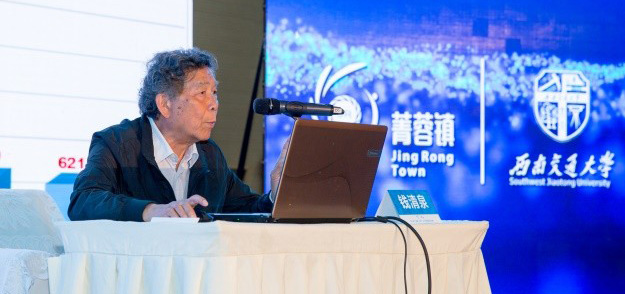QIAN Qingquan, born on May 7, 1936 in Danyang, Jiangsu Province, is an expert in railway electrification and automation, an academician of Chinese Academy of Engineering, professor & doctoral supervisor at Southwest Jiaotong University (SWJTU), and the former Director of National Rail Transit Electrification and Automation Engineering Technique Research Center.

In 1960, Qian graduated from the Electrical Machinery Department of Tangshan Railway Institute and was recruited there as a faculty member; starting from 1972, he has successively served as a teaching assistant, lecturer, associate professor and full professor at SWJTU; during 1984-1985, he stayed at Toshiba which was subordinate to the University of Tokyo then as a visiting scholar; in 1985, he joined the Communist Party of China; in 1986, he became the Director of the Railway Traction Electrification and Automation Institute of SWJTU; from 1990 to 1996, he worked as the dean of the School of Electrical Engineering of SWJTU; from 1996 to 2001, he served as the Director of the State Key Laboratory of Traction Power of SWJTU; he was appointed as an academician of Chinese Academy of Engineering in 1997, the Director of the Electric Automation Institute of the College of Electrical and Information Engineering of Jinan University in 2005, an honorary dean of Zhuhai College of Jinan University in 2013.
Over the past decade, he mainly engaged in education and teaching, talent cultivation and industrialization of scientific findings in the field of rail transportation. He also made a notable contribution to promoting the corporation between the Chinese Academy of Engineering and local government. In the aspect of high-speed railways, he spared no effort to fuel the development of China's high-speed railway construction, taking part in project demonstration, evaluation, identification, evaluation and implementation. The Chinese “Comprehensive SCADA System”, a scientific achievement of the research team led by Qian has been popularized, highly recognized and used in high-speed railways. In the development course of urban rail transit, he quickened the rise of linear motor traction train which has been applied to Guangzhou Metro successfully and become more and more popular. In the field of middle and low-speed maglev, he advocated establishment and research of middle and low-speed maglev train projects, including Beijing No. S1 line and Changsha Airport line.
Qian has committed himself to researching and teaching in rail transit electrification and automation for more than 60 years. He pioneered the study of “computer-based monitoring and comprehensive automation” and conducted researches into telemechanique for traction power supply systems in China.
上一条:ZHAI Wanming
下一条:SHEN Zhiyun